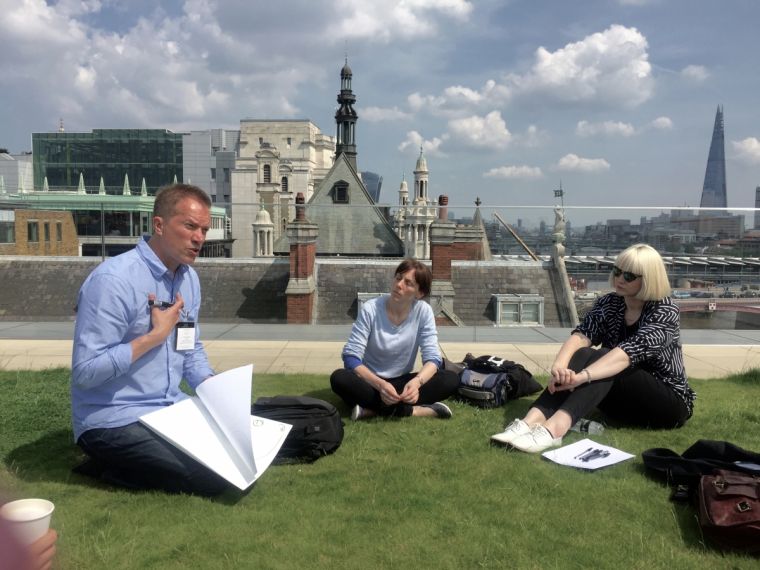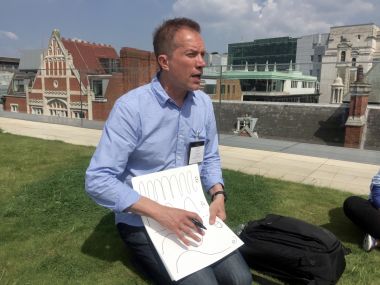Soulfulness: How to experience Christ's peace in a fast-paced world

Put Christianity together with "mindfulness" and the result, perhaps, is "soulfulness", hence the title of Dr Brian Draper's new book.
Retreat guide, writer and former editor of the Christian magazine Third Way, Draper is in town to promote a book that blends contemplative Christianity with meditation techniques more commonly associated with eastern traditions such as Buddhism.
Perhaps on top of the town is a better description than in town, because we are on a roof top near the Thames. We are gazing up at fluffy cotton-wool clouds set against an azure sky, clouds that could have been designed to look like godly beards, or angel wings. This makes them perfect to practise meditation on.
"I've found that some of the simplest, most common-sense techniques of mindfulness have helped me to learn more about my own Christian faith, and in particular how the ego-driven 'false sense of self' can mask the true," he writes in the book. "It's unearthed for me some of the spiritual treasures that so often end up buried beneath the soulless dogma of organised religion."
He's speaking into a culture of short attention spans and the endless distractions of news and social media feeds on the mobile phone. "We really struggle to give ourselves permission to be still," he tells us. Yet it is vital to build that into our routines, in a society where the tendency is to force ourselves to keep going, no matter what.

He has drawn on some of the theories around neuroscience in developing soulfulness techniques, such as the growing understanding that human minds are so much more than machines.
"We are not laptop computers," he tells us. "We are creatures that have rhythms." Many problems arise when we try to live and work as if we are computers.
He quotes Jesus, who outlined a method of prayer in Matthew 6 that comes close to much modern meditation. "When you pray, go into your room, close the door and pray to your Father, who is unseen." Jesus then went on to outline what to say, telling us the words of the Lord's Prayer and its plea for forgiveness, along with the commitment to forgive those who have sinned against us. These principles are at the root of so much mindfulness and I've long considered it a pity that Christianity has become associated in the minds of so many with judgmentalism and exclusivity. Many of the spiritual qualities that young people seeking for meaning in their lives, turn to the East to find, have been there in Christianity all along, in the teachings of Jesus, the contempative practices of the desert fathers.
Again, as Jesus said: "I have come that they may have life, and have it to the full." (John 10:10)
Soulfulness though is not just about theory. Draper takes us through a practical exercise that reveals all to clearly how in our busy lives we can so easily be tempted on a path that leads to burn-out.
Simply by understanding this process, he teaches, we can change the way we go about our lives. We can move from expeding energy on being actively useful, to resting and "restoring our soul" and back again, without being side-tracked into stress and exhaustion. And this is just question of being mindful of the cost of expending energy without renewal, and the limitations of our minds and bodies. As he says, we are not computers and we risk much by behaving as if we are.
He cites research about the proven benefits of meditation: improved memory, mood, relationships and health. It is about being "here", in the present, wakeful, or mindful, of the inner life, the soul, as well as what is going on around. He recommends "soulful" ways of making connections that go beyond mere status updates.
After meditating on the clouds, making shapes with them in the heavens like children, we are ready to come back down to earth. There is much in the Bible about hard work and we all have a lot of it to do. One method Draper recommends to make this more manageable is to factor appreciation or thankfulness into our daily routines, even to keep a "gratitude diary". This helps us train our brain to "look for goodness", no matter where we are. An interesting exercise for a journalist, certainly. So thank you, Dr Draper, for your brief introduction in these techniques. I'll try to bear it in mind, as my father would have said, for the good of my moral soul.
Soulfulness is published by Hodder Faith.











